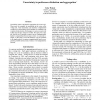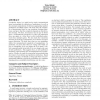11 search results - page 2 / 3 » Complexity of Manipulating Elections with Few Candidates |
AAAI
2010
13 years 2 months ago
2010
We consider the problem of manipulating elections via cloning candidates. In our model, a manipulator can replace each candidate c by one or more clones, i.e., new candidates that...
ATAL
2008
Springer
13 years 6 months ago
2008
Springer
We study the complexity of manipulation for a family of election systems derived from Copeland voting via introducing a parameter that describes how ties in head-to-head contests...
AAAI
2007
13 years 6 months ago
2007
Uncertainty arises in preference aggregation in several ways. There may, for example, be uncertainty in the votes or the voting rule. Such uncertainty can introduce computational ...
CORR
2006
Springer
13 years 4 months ago
2006
Springer
We study the complexity of influencing elections through bribery: How computationally complex is it for an external actor to determine whether by paying certain voters to change t...
ATAL
2008
Springer
13 years 6 months ago
2008
Springer
Complexity theory is a useful tool to study computational issues surrounding the elicitation of preferences, as well as the strategic manipulation of elections aggregating togethe...


